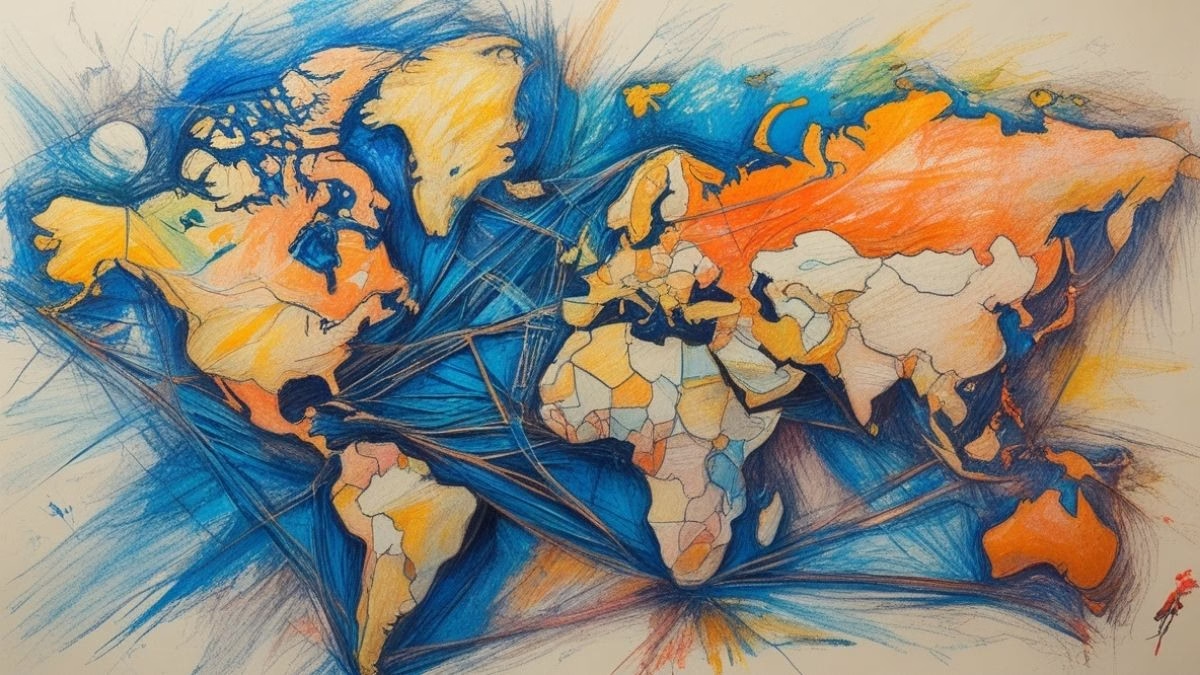Welcome! This lesson is crafted for the discerning English learner—someone like you, who is preparing for a high-stakes international exam and wants to move beyond the basics. Today, we’re tackling a complex topic: the role of national policies in our interconnected world.
Our proven method will guide you. First, immerse yourself in the 1000-word article below. The goal is to understand the core concepts and arguments. Then, join us for a detailed grammar analysis where we’ll dissect the sophisticated language used to build arguments, present causes, and hedge claims. This will provide you with the linguistic tools necessary to discuss complex global issues with confidence and precision. Let’s get started.
The Sovereignty Paradox: Crafting National Policy in an Interlinked Age
In an era defined by unprecedented global integration, the concept of national sovereignty has become extraordinarily complex. Whereas a century ago a nation’s government could formulate policy with a primary focus on domestic concerns, today, such an isolated approach is not only impractical but also arguably impossible. The relentless flow of capital, information, and people across borders means that decisions made in one capital can have profound and immediate consequences for citizens thousands of miles away. Consequently, policymakers find themselves navigating a delicate balancing act: serving their national interest while contending with a web of international dependencies and obligations.
One of the most salient examples of this challenge can be seen in economic policy. Owing to the interconnectedness of global financial markets, a nation’s control over its own economic destiny is fundamentally constrained. A central bank, for instance, might wish to lower interest rates to stimulate domestic growth. However, it must consider the potential for capital flight, should investors find more attractive returns elsewhere. This reality forces governments to formulate policies that are not only beneficial at home but also palatable to the international community. It would seem that the era of purely autonomous economic strategy has drawn to a close.
Environmental policy offers another compelling case. Climate change, a quintessential global problem, cannot be solved by any single nation, no matter how powerful. A country might implement stringent emissions standards, a policy laudable in its intent. Yet, if its neighbours continue to pollute with impunity, the solitary nation’s efforts will be largely negated, while its industries may be put at a competitive disadvantage. This is precisely why international agreements like the Paris Accord are so crucial, however difficult they may be to enforce. They represent a collective acknowledgement that in certain domains, sovereignty must be pooled to achieve any meaningful effect. It could be argued that the true test of modern statecraft is the ability to cede a degree of control for the greater good.
Trade policy is yet another arena where this tension is palpable. The rise of multinational corporations, whose supply chains crisscross the globe, has created immense wealth and efficiency. Nevertheless, it has also created vulnerabilities. A disruption in one part of the world, whether from a natural disaster or political instability, can cripple industries in another. Governments, therefore, are caught between the desire to foster free trade, which can lead to lower prices and greater choice for consumers, and the need to protect strategic industries and ensure economic resilience. The recent trend towards reshoring and reinforcing domestic supply chains is a direct response to this dilemma, representing a partial retreat from the hyper-globalization of the late 20th century.
Even social and cultural policies are not immune to global currents. The internet and social media have created a global public square where ideas and cultural norms are exchanged and contested with breathtaking speed. A government may wish to uphold certain traditional values, but it faces an uphill battle when its citizens, particularly the youth, are constantly exposed to a diverse array of global perspectives. This has led to complex debates over censorship, free speech, and national identity, the outcomes of which are still very much in flux. The policies that governments devise in this area must be incredibly nuanced, lest they be perceived as either oppressive or ineffective.
In conclusion, navigating the landscape of the 21st century requires a paradigm shift in how we think about national policy. The binary choice between nationalism and globalism is a false one. The reality is a complex interdependence in which national interests and global welfare are inextricably linked. The most successful policymakers of the future will be those who can operate effectively at this intersection. They will be the ones who understand that while their primary duty is to their own citizens, that duty can often only be fulfilled through robust international cooperation and a willingness to engage with a world that refuses to be contained by borders.
Grammar Analysis: Let’s Break It Down
That was a dense topic, but full of the kind of language you’ll need for high-level essays and discussions. Let’s examine the grammatical machinery at work.
[ppp_patron_only level=5]
1. Language of Cause and Effect
“Owing to the interconnectedness of global financial markets, a nation’s control over its own economic destiny is fundamentally constrained.“
“Consequently, policymakers find themselves navigating a delicate balancing act…“
- What is it? This is the language we use to link reasons with results. English has many ways to do this, and using a variety will make your writing more sophisticated.
- Owing to is a formal synonym for “because of.” It’s a preposition, so it must be followed by a noun or noun phrase (e.g., the interconnectedness).
- Consequently is a linking adverb (or adverbial) that means “as a result.” It connects two separate ideas or sentences, showing a logical progression.
- Why use it? In any analytical or argumentative writing, clearly showing cause-and-effect relationships is critical. Mastering phrases like owing to, due to, as a result of, consequently, therefore, and hence allows you to build a logical and convincing argument.
- Common Mistake: Mixing them up. Don’t write: “Owing to the markets are connected…” Remember, owing to is followed by a noun phrase, not a full clause (subject + verb). You would need to say: “Because the markets are connected…“
2. Hedging Language for Nuanced Claims
“It would seem that the era of purely autonomous economic strategy has drawn to a close.“
“It could be argued that the true test of modern statecraft is the ability to cede a degree of control…“
- What is it? Hedging is the use of cautious or non-committal language. In academic and formal writing, we rarely deal in absolute certainties. Hedging allows you to make claims that are strong but not overly simplistic or easy to disprove.
- Why use it? It makes you sound like a more careful and critical thinker. It shows that you understand the complexity of an issue. Instead of saying “This is the test,” saying “It could be argued that…” opens the door for discussion and shows you are presenting a particular viewpoint, not an undisputed fact. Other examples include: tends to, suggests, may, might, is likely to.
- Compare the tone:
- Direct: Globalization has destroyed national sovereignty. (Sounds extreme and is easily challenged)
- Hedged: It could be argued that globalization has significantly constrained national sovereignty. (Sounds more reasonable and academic)
3. Contrastive Linkers
“Whereas a century ago a nation’s government could formulate policy with a primary focus on domestic concerns, today, such an isolated approach is not only impractical but also arguably impossible.“
- What is it? Whereas is a subordinating conjunction used to introduce a clause that contrasts directly with the main clause. It’s a powerful and formal way to say “while” or “on the other hand.” It’s perfect for setting up a ‘then vs. now’ comparison.
- Why use it? It creates a well-structured, complex sentence that immediately highlights the central conflict or change you are discussing. It’s much more elegant than starting a new sentence with “But…”. Other useful contrastive linkers include while, although, and phrases like in contrast to.
- Sentence Structure: Notice the pattern: Whereas + [Clause 1], [Clause 2]. The comma is essential for separating the two contrasting ideas.
4. Complex Relative Clauses
“Governments… are caught between the desire to foster free trade, which can lead to lower prices…, and the need to protect strategic industries…“
“The policies that governments devise in this area must be incredibly nuanced…“
- What are they? Relative clauses (starting with who, which, that, whose, where) add extra information. The first example is a non-defining clause (which can lead…). It adds extra, non-essential information about free trade. Notice it is separated by a comma. If you remove it, the main sentence still makes sense.
- The second example is a defining clause (that governments devise…). It is essential information. It tells us which policies we are talking about. There is no comma.
- Why use them? They are the building blocks of complex sentences. Being able to use both defining and non-defining clauses correctly allows you to pack a lot of precise information into a single, flowing sentence, which is a key skill for advanced writing.
Summing Up and Your Next Steps
In this lesson, we’ve focused on the grammar of argumentation and analysis. We’ve seen how to link ideas with cause-and-effect language, how to make careful claims using hedging, how to create contrast with linkers like whereas, and how to add detail with relative clauses.
These are not just grammatical curiosities; they are the essential tools of sophisticated communication. Your task now is to start using them. When you write your next practice essay, consciously try to build a paragraph around a cause-and-effect chain. When you state an opinion, try hedging it with “It would seem that…”. Compare two ideas in a single sentence using “whereas”. The more you practice these structures, the more they will become a natural part of your linguistic toolkit, ready for you to deploy on exam day. Happy writing!
[/ppp_patron_only]










0 Comments